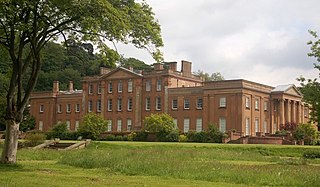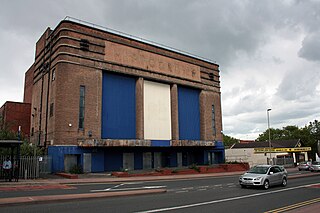
Dudley is a market town in the West Midlands, England, 6 miles (9.7 km) southeast of Wolverhampton and 8 miles (13 km) northwest of Birmingham. Historically part of Worcestershire, the town is the administrative centre of the Metropolitan Borough of Dudley. In the 2011 census, it had a population of 79,379. The wider Metropolitan Borough had a population of 312,900. In 2014, the borough council adopted a slogan describing Dudley as the capital of the Black Country, a title by which it had long been informally known.

Smethwick is an industrial town in the Sandwell district, in the county of the West Midlands, England. It lies 4 miles (6 km) west of Birmingham city centre. Historically it was in Staffordshire and then Worcestershire before being placed into West Midlands county.
Broughty Castle is a historic castle on the banks of the River Tay in Broughty Ferry, Dundee, Scotland. It was completed around 1495, although the site was earlier fortified in 1454, when George Douglas, 4th Earl of Angus, received permission to build on the site. His son, Archibald Douglas, 5th Earl of Angus, was coerced into ceding the castle to the crown. The main tower house forming the centre of the castle with four floors was built by Andrew, 2nd Lord Gray, who was granted the castle in 1490.

Dudley Zoo & Castle is a 40-acre (16 ha) zoo within a 200-acre densely-wooded site located within the grounds of Dudley Castle in the town of Dudley, in the Black Country region of the West Midlands, England. The zoo opened to the public on 18 May 1937. It contains 12 modernist animal enclosures and other buildings designed by the architect Berthold Lubetkin and the Tecton Group. The zoo went into receivership in 1977 and was purchased by Dudley Metropolitan Borough Council. Dudley Zoo is now operated by Dudley and West Midlands Zoological Society, founded in 1978 and a registered charity.

Brierley Hill is a town and electoral ward in the Metropolitan Borough of Dudley, West Midlands, England, 3 miles (4.8 km) south of Dudley and 1 mile (1.6 km) north of Stourbridge. Part of the Black Country and in a heavily industrialised area, it has a population of 13,935 at the 2011 census. It is best known for glass and steel manufacturing, although the industry has declined considerably since the 1970s. One of the largest factories in the area was the Round Oak Steelworks, which closed down and was redeveloped in the 1980s to become the Merry Hill Shopping Centre. Brierley Hill was originally in Staffordshire.

Earl of Dudley, of Dudley Castle in the County of the West Midlands is a title that has been created twice in the Peerage of the United Kingdom, both times for members of the Ward family.

Kingswinford is a town of the Metropolitan Borough of Dudley in the English West Midlands, situated 5 miles (8 km) west-southwest of central Dudley. In 2011 the area had a population of 25,191, down from 25,808 at the 2001 Census.

Amblecote is a village in the Metropolitan Borough of Dudley in the West Midlands, England. It lies immediately north of the historic town of Stourbridge on the southwestern edge of the West Midlands conurbation. Historically, Amblecote was in the parish of Oldswinford, but unlike the rest of the parish it was in Staffordshire, and as such was administered separately. It borders Audnam, Quarry Bank and Wollaston.

Witley Court, in Great Witley, Worcestershire, England, is a ruined Italianate mansion. Built for the Foleys in the seventeenth century on the site of a former manor house, it was enormously expanded in the early nineteenth century by the architect John Nash for Thomas Foley, 3rd Baron Foley.

Himley Hall is an early 17th-century country house situated in Staffordshire, England. It is situated in the south of the county in the small village of Himley, near to the town of Dudley and the city of Wolverhampton. Himley Hall is a Grade II* listed building. Its park and garden, which were extended in the 1770s by Lancelot "Capability" Brown, are Grade II listed with the National Register of Historic Parks and Gardens.

Francis Matcham was an English architect who specialised in the design of theatres and music halls. He worked extensively in London, predominantly under Moss Empires for whom he designed the Hippodrome in 1900, Hackney Empire (1901), Shepherd's Bush Empire (1903), Coliseum (1904), and Palladium (1910). His last major commission before retirement was the Victoria Palace Theatre in 1911 for the variety magnate Alfred Butt. During his 40-year career, Matcham was responsible for the design and construction of over 90 theatres and the redesign and refurbishment of a further 80 throughout the United Kingdom.

The Birmingham Hippodrome is a theatre situated on Hurst Street in the Chinese Quarter of Birmingham, England.
Solomon Andrews was a British entrepreneur and head of the Solomon Andrews and Son bus and tram-operating company, based in Cardiff.
This article is intended to show a timeline of events in the History of Birmingham, England, with a particular focus on the events, people or places that are covered in Wikipedia articles.

The Jersey Opera House is a working theatre and opera house in La Vingtaine de la Ville, Saint Helier, Jersey, Channel Islands. The theatre building is administered by the States of Jersey but is managed by Jersey Opera House Limited. The current interim theatre director is Andy Eagle.

Gornal is a village and electoral ward in the Dudley Metropolitan Borough, in the West Midlands of England. It encompasses the three historical villages of Upper Gornal, Lower Gornal, and Gornal Wood. Gornal was historically part of Staffordshire, prior to the creation of the West Midlands County in 1974. Gornal is 11 miles from Birmingham.

The Dudley Hippodrome was a theatre in the town of Dudley, West Midlands, England. The Hippodrome was built in 1938 on the site of the Dudley Opera House, which was destroyed by fire in 1936, and remained open as a variety theatre until 1964. It subsequently operated as a bingo hall by Gala Bingo before closing in 2009.

The Wright Opera House Block, also known as the Alma Opera House Block, is a commercial block located at 101–113 East Superior Street and 408 North State Street in Alma, Michigan. It was listed on the National Register of Historic Places in 2013.

Birmingham is an important centre for theatre in the United Kingdom. The earliest known performances in the city were medieval pageants and miracle plays. Birmingham's first permanent theatres and theatrical companies were founded in the 1740s, drawing both actors and performance styles from the fashionable theatres of London. During World War II, the Birmingham Blitz forced all performance venues in the city to close; most would stay closed throughout the war. The postwar introduction of television led to further theatre closures.

TheStation Hotel is a hotel and banqueting suite located in Dudley, West Midlands, England. The original hotel was built and partially opened in 1898, with it opening fully to the public in 1910. It was then demolished and renovated as part of a modernisation plan in 1936.




















